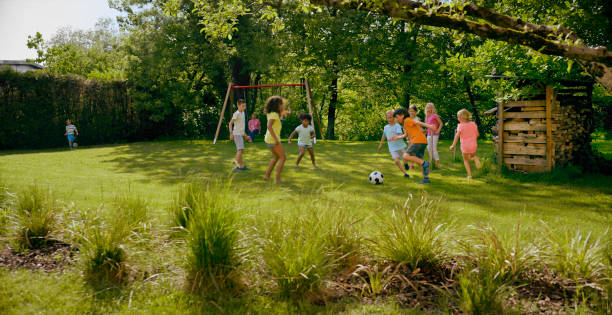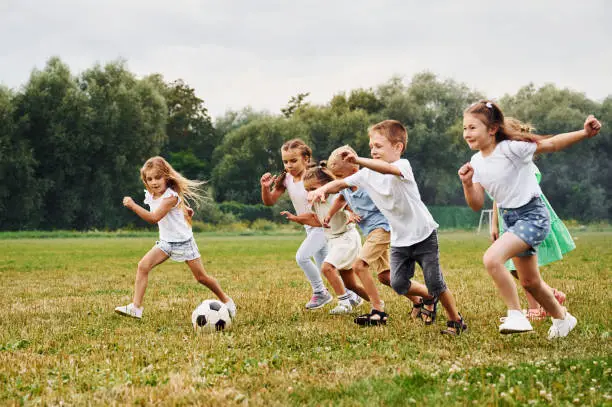In today’s digital age, where screens dominate and structured activities are the norm, the importance of outdoor play for children cannot be overstated. The American Academy of Pediatrics (AAP) emphasizes the critical role that outdoor play has in the physical, mental, and social development of children. Understanding why outdoor play is essential can help parents and caregivers prioritize this activity in a child’s daily routine. Outdoor play not only promotes physical development but also nurtures creativity and enhances social skills, contributing to a well-rounded and healthy childhood.

One of the most obvious benefits of outdoor play is its impact on physical development. Unlike indoor activities, which often involve sitting or minimal movement, outdoor play encourages children to engage in physical activities that are essential for their growth. Activities such as running, jumping, climbing, and swinging are not just fun—they are crucial for developing gross motor skills. These movements help children build strength, coordination, balance, and flexibility, which are important for overall physical health and for performing everyday tasks like writing, dressing, and paying attention in school. Additionally, outdoor play promotes cardiovascular health. Whether children are playing tag, riding a bike, or exploring their surroundings, these activities help improve heart health and maintain a healthy weight, reducing the risk of childhood obesity and establishing a foundation for lifelong physical activity. Furthermore, being outdoors exposes children to natural sunlight, which is vital for producing vitamin D. This nutrient is crucial for bone health, as it helps the body absorb calcium, leading to stronger bones and reducing the risk of fractures. Playing outside also boosts the immune system, as children are exposed to different natural elements, making them more resilient to infections and illnesses.

Beyond the physical benefits, outdoor play is a powerful catalyst for creativity. The unstructured nature of outdoor environments offers a blank canvas for a child’s imagination to flourish. Unlike indoor spaces, which may be more controlled and predictable, the outdoors provides endless possibilities for creative play. Children can build forts out of sticks, create imaginary worlds in a sandbox, or role-play with friends, all of which encourage them to think outside the box. This type of play fosters problem-solving skills as children learn to navigate their environment, use available materials creatively, and overcome obstacles they encounter. The natural world itself is a rich source of inspiration. Observing the changing seasons, discovering different plants and animals, and experiencing the weather firsthand can ignite a child’s curiosity and deepen their appreciation for the environment. This connection to nature can also stimulate an interest in science and a greater understanding of the world around them. Moreover, outdoor play often requires children to make decisions independently, such as choosing which path to take in a park or how to cross a stream. These experiences foster independence and self-reliance, helping children develop confidence in their abilities and trust in their instincts, which can translate to greater self-assurance in other areas of their lives.

Socially, outdoor play is invaluable. It naturally brings children together in shared spaces such as playgrounds, parks, and backyards, creating opportunities for interaction, collaboration, and relationship-building. Through outdoor play, children learn essential social skills, such as sharing, cooperation, and negotiation. Whether it’s taking turns on the swing, playing a game of hide-and-seek, or building a sandcastle together, these interactions teach children how to work as a team and how to handle social situations. These skills are crucial not only for forming friendships in childhood but also for maintaining relationships later in life. Outdoor play also provides a natural setting for children to learn how to manage conflicts. Disagreements over rules turns, or boundaries are common in group play, and navigating these conflicts helps children develop emotional intelligence. They learn to communicate their feelings, listen to others, and find compromises, all of which are critical for managing emotions like frustration, disappointment, and anger in a healthy way. Additionally, outdoor play often involves a great deal of communication, whether children are organizing a game, telling stories, or negotiating roles in pretend play. These interactions help children develop their verbal and non-verbal communication skills, teaching them how to express themselves clearly, understand others, and interpret social cues, such as body language and tone of voice. These communication skills are essential for successful social interactions throughout life.
Moreover, outdoor play is beneficial for mental health. Spending time outdoors has been shown to reduce stress, anxiety, and symptoms of attention disorders in children. The natural environment is inherently calming, and the sights, sounds, and smells of nature can help reduce stress and anxiety in children. Simple activities like playing in the grass, listening to birds, or watching clouds can have a soothing effect, helping children relax and unwind. For children with attention disorders, outdoor play can be particularly beneficial. Research shows that children with ADHD (Attention Deficit Hyperactivity Disorder) experience improved focus and reduced symptoms after spending time in nature. The open space and freedom to move allow these children to expend energy in a healthy way, which can lead to better concentration when they return to more structured environments. Overall, outdoor play contributes significantly to a child’s sense of well-being. The combination of physical activity, creative exploration, social interaction, and connection with nature promotes happiness and contentment. Children who regularly engage in outdoor play tend to be more resilient, adaptable, and confident.

In conclusion, the benefits of outdoor play for children are vast and multifaceted, touching on every aspect of their development. From building strong bodies and inspiring creativity to enhancing social skills and promoting mental health, the outdoors offers countless opportunities for growth and learning. In a world where indoor activities and screen time are increasingly prevalent, it is essential to prioritize outdoor play in children’s daily routines. By encouraging children to explore, imagine, and interact with the world around them, we are setting the foundation for healthier, happier, and more well-rounded individuals.
